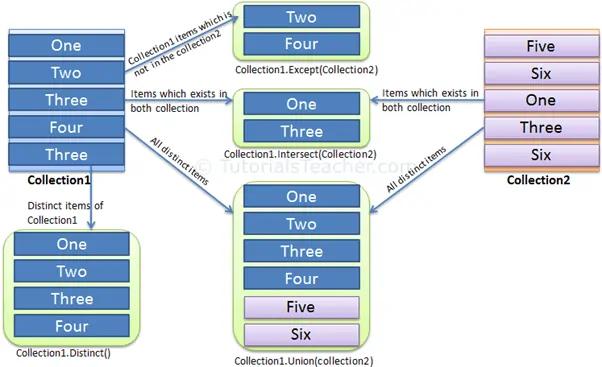Set Operator: Union
The Union extension method requires two collections and returns a new collection that includes distinct elements from both the collections. Consider the following example.
IList<string> strList1 = new List<string>() { "One", "Two", "three", "Four" };
IList<string> strList2 = new List<string>() { "Two", "THREE", "Four", "Five" };
var result = strList1.Union(strList2);
foreach(string str in result)
Console.WriteLine(str);Two
three
THREE
Four
Five
The Union extension method doesn't return the correct result for the collection of complex types. You need to implement IEqualityComparer interface in order to get the correct result from Union method.
Implement IEqualityComparer interface for Student class as below:
public class Student
{
public int StudentID { get; set; }
public string StudentName { get; set; }
public int Age { get; set; }
}
class StudentComparer : IEqualityComparer<Student>
{
public bool Equals(Student x, Student y)
{
if (x.StudentID == y.StudentID && x.StudentName.ToLower() == y.StudentName.ToLower())
return true;
return false;
}
public int GetHashCode(Student obj)
{
return obj.StudentID.GetHashCode();
}
}Now, you can pass above StudentComparer class in the Union extension method to get the correct result:
IList<Student> studentList1 = new List<Student>() {
new Student() { StudentID = 1, StudentName = "John", Age = 18 } ,
new Student() { StudentID = 2, StudentName = "Steve", Age = 15 } ,
new Student() { StudentID = 3, StudentName = "Bill", Age = 25 } ,
new Student() { StudentID = 5, StudentName = "Ron" , Age = 19 }
};
IList<Student> studentList2 = new List<Student>() {
new Student() { StudentID = 3, StudentName = "Bill", Age = 25 } ,
new Student() { StudentID = 5, StudentName = "Ron" , Age = 19 }
};
var resultedCol = studentList1.Union(studentList2, new StudentComparer());
foreach(Student std in resultedCol)
Console.WriteLine(std.StudentName);Steve
Bill
Ron
Query Syntax
The Union operator is Not Supported in C# & VB.Net Query syntax. However, you can use Union method on query variable or wrap whole query into brackets and then call Union().
The following figure shows how each set operators works on the collections:

